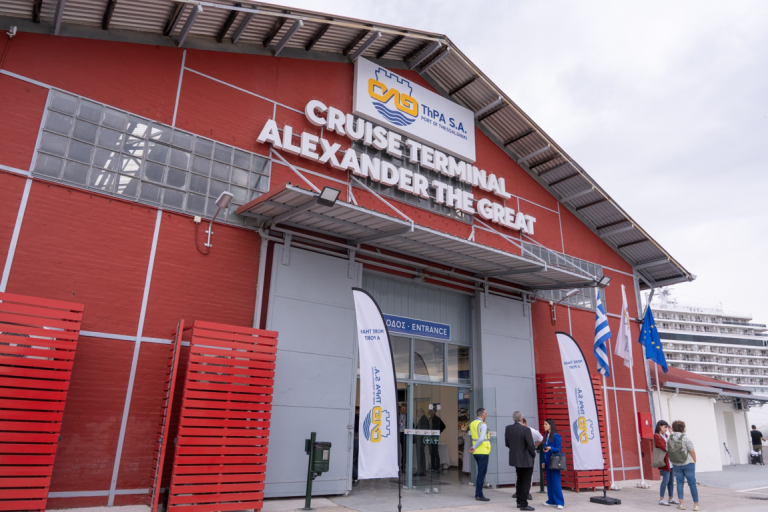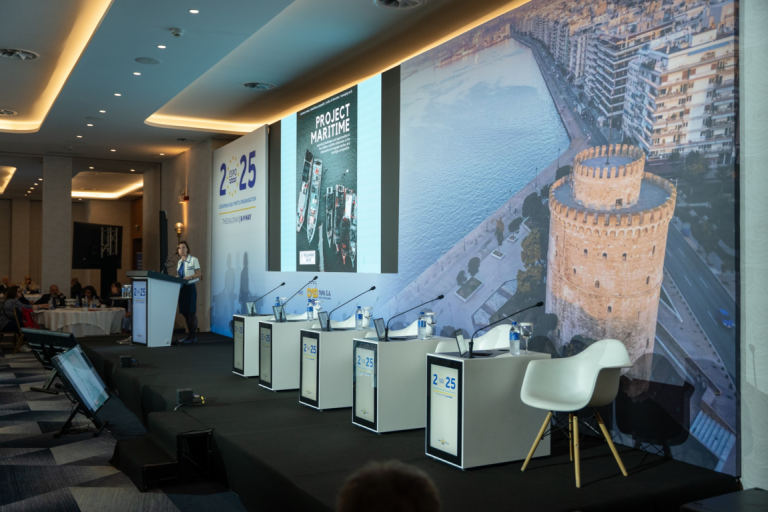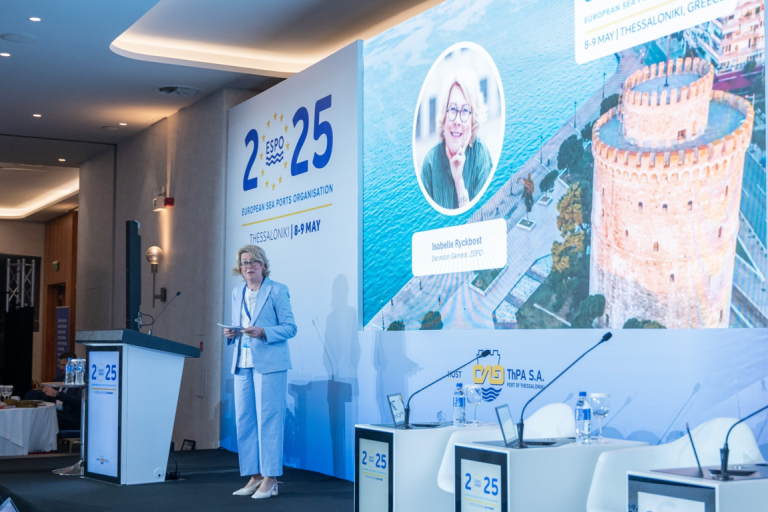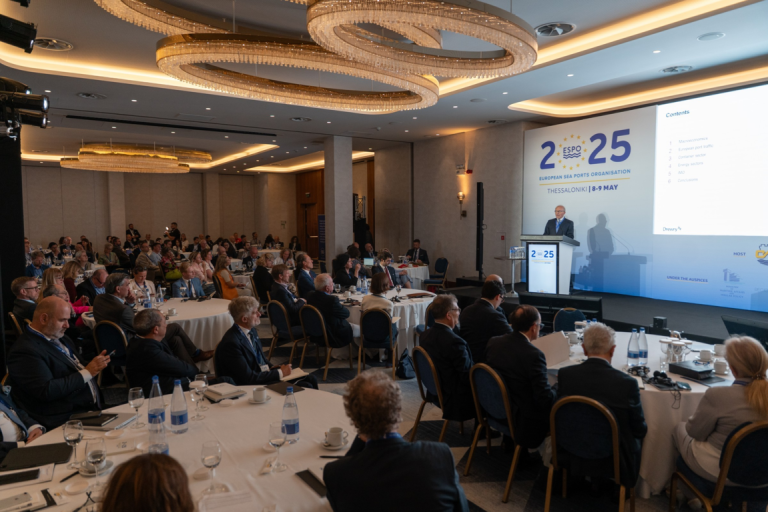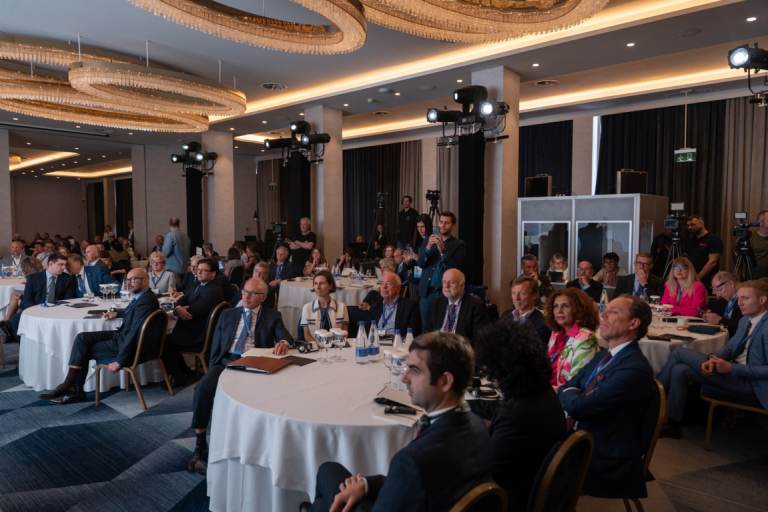ESPO Conference 2025: the future of European ports
Last May, the city of Thessaloniki had the honor of hosting the ESPO Conference for the first time, the annual event organized by the European Sea Ports Organisation, a key platform for dialogue and cooperation among European ports, industry stakeholders, and policymakers.
This twenty-first edition of the conference took place at the Makedonia Palace Hotel, attracting an international audience of experts, leaders, and prominent representatives from the port sector. The opening of the conference was entrusted to Ansis Zeltiņš, ESPO President, who immediately emphasized the symbolic significance of Thessaloniki as the city where “East and West meet,” and whose port has been a strategic hub for over 2,300 years. Zeltiņš described the port as a historic crossroads that still represents a fundamental connectivity point in the Mediterranean, capable of combining deep-rooted tradition with a vision aimed at the future. In his speech, he highlighted the crucial importance of European ports as essential infrastructures for Europe’s resilience, security, competitiveness, and sustainability. He clearly stated that ports in the European Union are and will continue to be fundamental actors in a world characterized by energy transition, global fragmentation, and pressures on digitalization, decarbonization, and strategic autonomy.
Cruise Temrinal Alexander the great
espo
One of Zeltiņš’s most incisive reflections was that ports cannot passively observe these challenges but must become active builders of solutions. While recognizing the diversity of individual port realities, he reiterated that, collectively, ports constitute critical infrastructure for achieving Europe’s ambitions in green, digital, and geopolitical fields. For this reason, the conference had a particular focus on the new European Ports Strategy, aimed not at imposing new burdens but at providing a realistic, flexible regulatory framework oriented to supporting and enhancing the specificities of each port.
Zeltiņš’s message was clear: Europe must invest in its ports like never before because without modern and resilient port infrastructure, a true energy transition or a zero-emission industry will not be possible. He also warned against excessive caution that could result in isolation, instead arguing that ports must remain open gateways for trade and global connectivity.
The first day of the conference featured a dense program of presentations, with insights ranging from the macroeconomic overview of ports to the post-2024 geopolitical context, through energy prospects and European cooperation in an increasingly unstable world. Among the prominent speakers were Stefanos Gkikas, Deputy Minister of Maritime Affairs and Island Policy of Greece, and Apostolos Tzitzikostas, European Commissioner for Sustainable Transport and Tourism, who provided a clear institutional vision on the strategic role of ports in the European context.
PORT EXECUTIVE LOUNGE da sx Mar Chao,Göran Eriksson, Federica Montaresi e moderatore Tommaso Spanevello
espo
A particularly stimulating session was the “Port Executive Lounge,” where CEOs of major European ports debated the role of ports in a tense geopolitical context. Among the reflections that emerged was the question of whether ports should be considered “key agents” or “easy targets” in a world marked by growing global tensions. The discussion emphasized the importance of ensuring a level playing field, with rules that do not penalize European ports in global competition, safeguarding the strategic resilience of the entire continent.
In the afternoon, topics such as the reactions of cargo owners to global changes, new strategic alliances like that with India, and strategies to address shifts in trade flows were explored. Another CEO session analyzed how ports are adapting their strategies in the face of these new challenges, highlighting the importance of strong cooperation and a shared vision.
At the end of the day, participants had the opportunity to engage in more informal and interactive breakout sessions, covering highly relevant topics such as green port planning, the adoption of onshore power supply technologies, tolerance limits for cruise tourism, military mobility, and digitalization as a driver of decarbonization. These moments of direct dialogue represented a valuable opportunity to exchange experiences and build concrete synergies.
Isabelle Ryckbost, Secretary General, ESPO
espo
The second day, also celebrating Europe Day, opened with interventions highlighting the crucial role of ports in ensuring military preparedness, mobility, and energy security. The participation of NATO representatives and the European Commission enriched the discussion, underscoring the strategic importance of ports not only as economic infrastructures but also as fundamental elements for defense and security.
Another key moment was the deep dive into the need for modern, sustainable, and resilient infrastructures to build a zero-emission Europe. The intervention of the European Court of Auditors and the subsequent debate with port sector experts provided a clear picture of the financial and technical challenges to be faced to achieve these ambitious goals. The conference concluded with a final moment of reflection among the CEOs of European ports, who reiterated the importance of a common, inclusive, and forward-looking strategy. The ESPO President officially closed the event, emphasizing the value of collaboration and continuous dialogue among all sector actors.
espo
The event was organized with the fundamental support of the Port of Thessaloniki, which demonstrated its international relevance as a strategic hub in the Mediterranean and Southeastern Europe, as well as its ability to promote an integrated and innovative vision for port development. The success of the conference confirmed Thessaloniki not only as a port with millenary history but as a dynamic and cutting-edge platform for future challenges.
Ultimately, the ESPO Conference 2025 represented a crucial moment of discussion to define the role of European ports in a complex and rapidly evolving world. Between geopolitics, energy transition, and digital innovation, the conference delivered a strong message: European ports are not mere infrastructures but strategic pillars for the continent’s prosperity, security, and sustainability.
Don’t miss news, updates, and reviews about the world of cruising on Cruising Journal.

